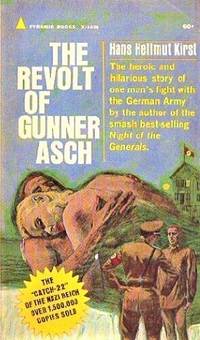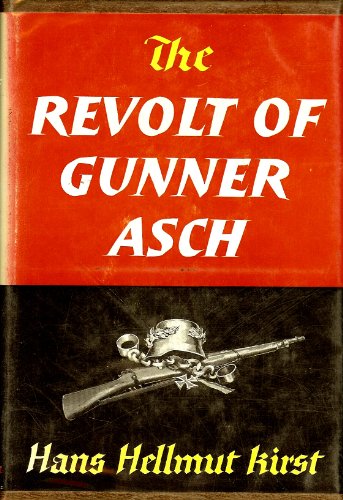The Revolt of Gunner Asch (1954) by Hans Helmut Kirst
Good Reads meta-data is 240 pages, rated 3.90 by 330 litizens.
Genre: Fiction.
DNA: Deutsch; Species: Nazi.
Verdict: Meticulous and boring.

Tagline: One man’s war against the Wehrmacht from within.
In late 1938 or early 1939 in a small garrison town in northern Germany Herbert Asch is a reluctant draftee who observes the absurdity of military life. In the main the insanity is common to all armies. Any veteran will recognise the characters and situations, though in this case there is the added frisson that we know which way the wind of history is blowing, but Asch does not.
As is typical in all-male groups, efforts are made to identify and abuse the weakest link. For simplicity sake, Kirst limits this behaviour to the NCOs, and they focus on a harmless and hapless conscript who is a friend of Asch. Driven nearly to suicide by the relentless abuse, Asch saves this friend and declares his private and personal war on the Wehrmacht.
His heavy artillery are the many convoluted, contradictory, and obscure rules and regulations that govern army life. Think of Jim Kirk talking a computer to death and that is Asch’s approach. With a blizzard of references to regulations, sub-paragraphs, dictates, and more, he soon rattles the leader of the NCOs into a blunder.
For armour Asch uses the general indifference of officers to events in the barracks, as long as it does not blot their own personal careers. The best way to insure that does not happen is never to record irregular occurrences, like fights, like lost ammunition, AWOLs. If these things happen, and they do, and if they are recorded, then it means the relevant officers have failed! Although daily reports are written in indelible ink, where there is a will, there is a means… If they happen and are not recorded, well promotion remains within sight.
Asch’s infantry are the records he makes himself by observing the petty grifting, marital infidelity, and absences of the NCOs. This black book of data settles much hash.

The telling is precise, but, well, holds little interest to this reader. Asch’s campaign is the subject of at least three over novels by Kirst, but I am not at the moment motivated to continue. It bears a passing resemble to Catch-22 but it is neither as funny nor as poignant as that novel. Moreover, the shadow of hindsight darkens it.

